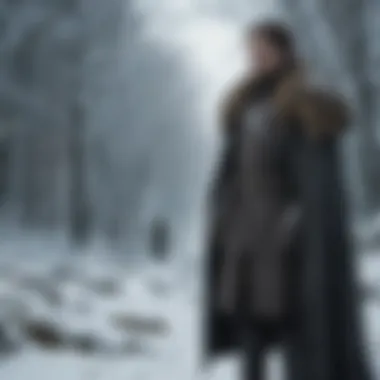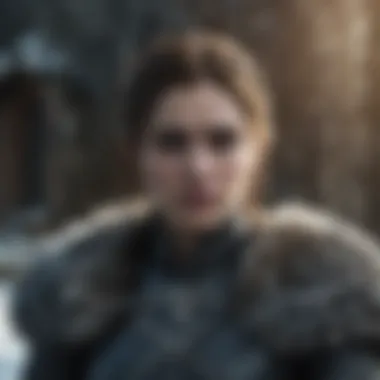Winter's Impending Threat: Themes in Game of Thrones


Intro
The phrase "Winter is Coming" permeates the entire narrative of Game of Thrones, resonating through its themes and character arcs. It serves as a reminder of the harsh realities of life and the inevitable challenges that lie ahead. The implications of this phrase go beyond mere weather prediction, encapsulating the broader socio-political climate within the world of Westeros. This article aims to unravel the complexities embedded in the story, offering insights into its rich character development, thematic explorations, and hidden lore.
Character Dissections
Detailed analysis of key characters in Game of Thrones
Game of Thrones is renowned for its intricate characterizations, where no character is wholly good or evil. Each character embodies unique motivations that drive the plot forward. For instance, Tyrion Lannister portrays cunning intelligence wrapped in vulnerability. His journey from being underestimated to becoming a pivotal player in political maneuvering exemplifies the theme of survival against overwhelming odds.
Another compelling character is Jon Snow. His lineage creates an internal struggle that informs his decisions and relationships throughout the series. Jon’s development, from a perceived illegitimate child to a leader facing moral dilemmas, reflects the larger narrative of identity and duty within the series.
Character development throughout the series
Character arcs in Game of Thrones serve as lenses through which the themes are explored. Daenerys Targaryen's transformation from a timid girl to a fierce leader illustrates the themes of power and the burdens that come with it. Her initial innocence becomes tainted by the harsh reality of her quest for the Iron Throne, culminating in a complex portrayal of a ruler caught between her ideals and the means to achieve them.
The moral ambiguities of characters like Cersei Lannister highlight the ruthless nature of political ambition. Her journey reflects the destructive quest for power and the lengths one may go to protect oneself and one’s children.
Impact on the overarching storyline
The characters in Game of Thrones do not merely serve a narrative function; they embody the thematic core of the series. Their decisions, fraught with consequence, shape the political landscape of Westeros. Whether through alliances or betrayals, each character contributes to the pileup of climactic tensions that drive the story.
This exploration of characters almost feels like an echo of the larger theme embedded in the phrase, "Winter is Coming." Characters often face the consequences of their choices as the narrative unfolds, illuminating the inescapable reality of their circumstances.
"The past is the past. What’s done cannot be undone." - Reflects the series' contemplation on choices and their impacts.
Episode Breakdowns
Recap of significant events in each episode
Each episode of Game of Thrones is packed with significant developments that further the overarching narrative. Consider the iconic opener of Season 1, where we are introduced to the threat beyond the Wall. This foreshadows the looming danger of the White Walkers, setting the stage for the trials that characters must face.
Exploration of themes and symbolism
Symbols recur with purpose in each episode. The Stark family motto, "Winter is Coming," is not just a warning but a call to resilience. It serves as a metaphor for the trials faced by the Stark family and their commitment to lasting integrity.
Key moments and their implications
Moments like the Red Wedding starkly illustrate the fragility of alliances and trust. Such events remind viewers of the harsh realities of power dynamics in a ruthless world, emphasizing that even the most well-made plans can unravel with betrayal.
Lore Explorations
Delving into the rich history and lore of Westeros
Westeros is not merely a backdrop; its history is rich with tales of valor, tragedy, and lessons learned. Understanding this lore enhances the viewer’s comprehension of characters and their motivations, shedding light on why they act as they do.
Uncovering hidden details and connections
Many characters refer to events from previous generations, creating layers of complexity within relationships. For instance, the Targaryens' history informs Daenerys’s struggles and decisions, bridging historical context within current conflicts.
Exploring the cultural and mythical aspects of the world
The cultural dynamics in Game of Thrones are steeped in myths and traditions that define the characters' identities. The integration of dragons, direwolves, and the significance of the Wall serve both narrative and symbolic purposes, further illustrating the deeper connections within this intricate world.
Fan Theories
Compilation of popular and intriguing fan theories
Game of Thrones has spawned numerous fan theories that offer alternative perspectives on the narrative. One popular theory suggests that Tyrion Lannister may be a Targaryen, which adds layers of intrigue to his character and interactions with Daenerys.
Evaluation of theories based on evidence from the show
Exploring such theories through various episodes reveals hidden hints and clues that support these claims. The consistent theme of identity throughout the series allows fans to speculate intelligently about possible outcomes.
Speculation on future plot developments
As the series progresses, it is interesting to speculate on how characters' arcs might resolve. Fans often debate potential alliances and betrayals, considering how the thematic essence of "Winter is Coming" will play a critical role in shaping the finale.
The nuances embedded in the phrase "Winter is Coming" stretch across characters, events, and lore, encapsulating the dark and intricate world of Game of Thrones. Each thread interweaves to create a tapestry that continues to captivate and engage audiences, making it a subject worthy of exploration and discussion.
The Significance of 'Winter is Coming'
In the realm of Game of Thrones, the phrase 'Winter is Coming' serves as a gripping reminder of the challenges that lie ahead. It encapsulates the constant threat of impending doom, marking more than just a seasonal change. This phrase reflects the overarching themes of power, survival, and foreboding in George R.R. Martin's intricate narrative. As the story unfolds, the implications of this phrase become increasingly apparent, highlighting the importance of preparation against adversities.
An Overview
The Stark family, the central characters associated with this phrase, embody its core message. For them, winter signifies much more than cold and snow; it represents loss, strife, and the harsh realities of life in Westeros. In the Stark stronghold of Winterfell, the motto is not merely decorative but a philosophical call to arms, reinforcing values of vigilance and resilience. Each encounter with winter wakes characters from their complacency, forcing them to ensure their survival amid turmoil.
Moreover, the phrase sets a foreboding tone that resonates throughout the series. This encompasses not just physical threats, like the White Walkers, but also the political machinations in a treacherous realm. The significance of 'Winter is Coming' permeates character development, influencing decisions that lead to alliances or betrayals.
Symbolism and Foreshadowing
The thematic weight of 'Winter is Coming' extends beyond its literal meaning. It serves as a profound symbol of the inevitable challenges each character must face, making it essential to the overall narrative.
- Preparation and Caution: For the Starks, the phrase acts as a constant reminder of the need to be vigilant. The motto emphasizes a philosophy of being prepared for the worst, a quality that proves crucial as the series deepens into conflicts.
- Foreshadowing Misdirection: The ominous warning suggests that danger is always present. It foreshadows not only physical threats but moral dilemmas. The consequences of choices that seem inconsequential or minor often snowball into larger crises, emphasizing the complex nature of choices in life.
- Social and Political Commentary: The phrase also critiques the political climate of Westeros. The constant struggle for power is akin to preparing for winter, as characters must navigate alliances and enmities, all while keeping their own interests in mind.
"In the game of thrones, you win or you die. There is no middle ground." - Cersei Lannister
In summary, the significance of 'Winter is Coming' lies in its ability to encapsulate the myriad challenges characters face and the ever-present danger surrounding them. Through symbolism and foreshadowing, this phrase remains a central pillar in understanding the depth of the narrative and themes within Game of Thrones.


Understanding the Stark Family
The Stark family stands as the backbone of the narrative in Game of Thrones. Their principles, values, and individuals form a crucial part of the overall story. Understanding the Stark family allows us to appreciate the moral dilemmas faced by the characters and the complexities of their relationships. The Starks embody the themes of loyalty, honor, and the stark realities of power. As the series develops, their struggles and ideals become a lens through which the harsh realities of Westeros are viewed.
House Stark: Principles and Values
House Stark is well-known for its commitment to values such as honor and loyalty. These principles govern their actions and decisions throughout the series. The Stark family motto, "The North Remembers," signifies their resilience and a deep connection to their homeland and its history. This connection shapes their identity and influences their interactions with other houses.
The Starks are not perfect, but their adherence to their principles often sets them apart in a world filled with treachery. This commitment sometimes leads to devastating outcomes, especially as the struggle for power intensifies between the families of Westeros.
"The North remembers."
Ned Stark: The Reluctant Hero
Eddard "Ned" Stark embodies the archetype of a reluctant hero. While honorable and noble, his sense of duty often places him in perilous situations. He makes choices based on a strong moral compass, sometimes prioritizing honor over pragmatism. His role as Hand of the King presents him with challenges that test his values and commitments.
Ned's eventual downfall serves as a poignant reminder of the dangers faced by those who adhere strictly to their ideals in a world where cunning often prevails. His tragic arc has significant implications for the Stark family, as it breeds a legacy of loss and struggle among his children.
Catelyn Stark's Role and Influence
Catelyn Stark, born as Tully, adds depth to the Stark family's dynamic. As a mother and protector, she plays an essential role in defending the interests of her children. Her strong-willed nature often drives the storyline in unexpected directions. Catelyn's loyalty to her family is unwavering, yet it leads her into conflicts, especially regarding her perception of Jon Snow. Her role in the series illustrates the complexities of loyalty among family members and the emotional dilemmas they face.
Her actions reflect the broader struggle women endure in a patriarchal society—balancing duty to family while wrestling with personal beliefs and desires.
Jon Snow: Identity and Belonging
Jon Snow's journey explores themes of identity and belonging. Raised as the illegitimate son of Ned Stark, Jon wrestles with his place within the Stark family and the greater society. His experiences highlight the struggles associated with being an outsider. This conflict fosters a strong desire to prove himself and to gain acceptance.
Throughout the series, Jon evolves into a leader who embodies the values of House Stark. His later alliances and decisions reflect a more nuanced understanding of loyalty, particularly as he becomes embroiled in larger conflicts beyond his family.
In summary, understanding the Stark family enriches the narrative of Game of Thrones. Their principles and personal struggles illustrate the contrasting themes of loyalty, honor, and the harsh realities of life in Westeros.
The Theme of Power and Its Consequences
The theme of power is a cornerstone of the narrative within Game of Thrones. It serves as a driving force for many characters and plot developments. Power, in this world, is not merely about control, but it encompasses ambition, moral corruption, and the sacrifices made to obtain and maintain authority. This article will examine how power manifests in various forms and the consequences that arise from it.
Various Representations of Power
In Game of Thrones, power is depicted in numerous ways, from political maneuvering to brute force. Several houses seek power, often leading to alliances and betrayals. For instance, houses like Lannister and Baratheon illustrate the connection between wealth and political power.
Furthermore, magic also represents a form of power. The White Walkers, with their supernatural abilities, present a stark contrast to the human struggles for power. This connection between mystical elements and the search for dominance adds depth to the series. Several characters wield power over others by exploiting their weaknesses, demonstrating that manipulation can be more potent than straightforward conflict.
Among various characters, Tyrion Lannister exemplifies how intellect often takes precedence over sheer military might. His character shows that strategic thinking often yields more benefits in power struggles than brute strength or traditional warfare. The subtlety of power is showcased when he aligns with different factions while remaining a player in the game, even when he is not on the throne.
Power Dynamics in Westeros
The intricate power dynamics of Westeros mirror real-world political landscapes. The narrative explores how power shifts among families and factions, reflecting the cruel nature of political ambition. Themes of loyalty, betrayal, and the pursuit of power create a complex web that characters navigate throughout the series.
The rivalry between House Stark and House Lannister epitomizes this struggle for power. While the Starks represent honor and duty, the Lannisters often employ cunning and manipulation. These diverging ideologies illustrate that the path to power can take many forms, each with fatal consequences.
"Power resides where men believe it resides. It’s a trick, a shadow on the wall."
—— Varys, Game of Thrones
The balance of power can change rapidly, often resulting in bloodshed and loss. Key moments, such as the Red Wedding, epitomize the violent measures that factions will resort to in order to secure dominance. In these instances, the consequences of power can be both devastating and transformative, altering the very fabric of relationships and alliances.
Additionally, the rise of significant figures like Daenerys Targaryen highlights the complexities of power. Her journey from exile to a formidable contender for the Iron Throne showcases the range of power dynamics in play. Her dragons symbolize not just family legacy but also the raw, destructive power that can reshape destinies.
In sum, the theme of power and its consequences in Game of Thrones illustrates an intricate exploration of ambition, motivation, and human nature. The depth of character development intertwined with power struggles offers a compelling backdrop for understanding the far-reaching implications of authority in a world where winter is always coming.
The Concept of Loyalty and Betrayal
Loyalty and betrayal are central themes in Game of Thrones, driving character motivations and plot outcomes. The complexity of these themes reflects the harsh realities of power struggles in Westeros. Characters often grapple with the tension between loyalty to their family, their house, and their personal convictions. The narrative intricately weaves these concepts to create moral ambiguity, showcasing how decisions shaped by loyalty can lead to unexpected consequences.
In examining loyalty, it is crucial to recognize its dual nature. A character's devotion may at times incentivize ruthless actions or result in self-sacrifice. Betrayal lurks around every corner, often leading to catastrophic repercussions within the brutal landscape of the series. This duality poses questions about the integrity of relationships and the impact of choices.
Loyalty as a Double-Edged Sword
Loyalty, while often viewed as a virtue, plays a more complicated role in Game of Thrones. Characters demonstrate unwavering allegiance to their leaders and loved ones, yet this can lead them to betray their own moral compass. For instance, characters like Jaime Lannister exhibit profound loyalty to his sister, Cersei, causing him to make choices against the very ideals of honor he once held.
The consequences of such loyalty manifest in various ways:
- Personal Sacrifice: Characters risk their lives, often making promises that demand painful sacrifices.
- Turbulence in Relationships: Loyalty sometimes strains relationships, leading to fractures even in families.
- Moral Compromise: Devotion can warp a character’s sense of right and wrong, blurring ethical boundaries.
This duality reflects the notion that unwavering loyalty can also endanger a character's identity and moral framework.
Cases of Betrayal Throughout the Series
Betrayal is a recurring motif in Game of Thrones, illustrating the fragility of trust. Throughout the series, significant betrayals propel the plot and shift power dynamics.
Some notable betrayals include:
- Ned Stark's Execution: His adherence to honor ultimately leads to his downfall when he refuses to compromise his beliefs in a treacherous court.
- The Red Wedding: This shocking event showcases how alliances built on trust can unravel tragically, highlighting the harsh reality of political marriages.
- Littlefinger’s Manipulations: Petyr Baelish constantly betrays those closest to him, illustrating how ambition overrides loyalty in the quest for power.
These instances emphasize that trust is a fragile commodity in Westeros. The interplay between loyalty and betrayal reveals that even the strongest bonds can fracture, resulting in chaos and unpredictability.
"In the world of Game of Thrones, loyalty may lead to glory or doom, and betrayal the inevitable cost of ambition."
Ultimately, the interplay of loyalty and betrayal enriches Game of Thrones, making it a compelling study of human nature in the face of dire choices.
Nature vs. Nurture: The Impact of Environment
The theme of nature versus nurture plays a crucial role in Game of Thrones, providing a framework to analyze character development and motivations. This dichotomy reflects how individuals are shaped by their genetic backgrounds against how their environments influence them. As we dive into various character arcs, particularly of the Stark family and others, we see the tension between inherent traits and external factors that mold their decisions and destinies. In the context of the series, this theme prompts significant discussions about responsibility, identity, and the moral choices characters confront.


Character Development Influenced by Circumstances
Characters within Game of Thrones often find themselves in situations where their circumstances force a reevaluation of who they are and what they represent. The environment acts as a catalyst that triggers growth or decline. For instance, take Sansa Stark. Initially, she displays traits of naivety and a desire for a fairy-tale life, influenced by her romantic ideals. However, as she faces betrayal and hardship, especially in King's Landing, her character begins to evolve. The harsh realities of her environment prompt her to adapt, gain resilience, and ultimately reforge her identity. This transformation illustrates how Sansa’s development is significantly nurtured by her experiences rather than just her Stark lineage.
Conversely, Jaime Lannister serves as another example. He begins the series as a seemingly arrogant individual, proud of his skills as a knight. However, after losing his hand, Jaime is faced with a new reality and forced to confront his values. His character arc reveals how the pressures of circumstance urge him to reconsider his earlier beliefs and actions. His journey highlights the conflict between his innate tendencies toward pride and the transformative influence of his environment.
Case Studies: Sansa Stark and Jaime Lannister
Both Sansa Stark and Jaime Lannister epitomize the nature versus nurture debate within the context of Game of Thrones. These characters illustrate how personal evolution is intricately tied to the external pressures they face.
- Sansa Stark: Her development reflects how trauma and adversity can catalyze profound changes in personality. Originating from a sheltered background, her initial innocence crumbles due to experiences of loss and betrayal. Each event shapes her into a strategic thinker, illustrating a critical shift from external influences that reshape her identity.
- Jaime Lannister: Initially, Jaime’s confidence and bravado stem from both his abilities and his family’s reputation. However, losing his hand signifies not just a physical transformation but a loss of identity. His navigation through guilt, responsibility, and redemption leads him into morally complex territories. His shifts illustrate how externally imposed challenges can reforge individual identities.
"What makes you who you are? Is it blood, or is it experience?"
This question resonates throughout the narrative, compelling viewers to question the essence of identity as shaped by circumstances.
The Role of Women in Game of Thrones
The importance of the role of women in Game of Thrones transcends mere character development. It reveals how gender dynamics shape the narrative and influence the power structures within Westeros. Women in this universe are often portrayed in diverse manners, some conforming to traditional roles while others break free from them. The series invites viewers to analyze these characters not just as mere supporting figures but as pivotal players within the complex web of politics and conflict that defines the story. This focus on female characters adds layers to the overarching themes of power, loyalty, and ambition, demonstrating how their experiences reflect broader societal issues.
A Diverse Range of Female Characters
Game of Thrones presents a spectrum of female characters that challenge and conform to societal expectations. For instance, characters like Daenerys Targaryen embody ambition and resilience, showcasing a desire for power that is often denied to women in her society. On the other hand, Cersei Lannister represents a more traditional view, wielding her influence primarily through her relationships with men. The contrast between these figures highlights the various ways in which women navigate their world, each with their unique motivations and abilities.
- Daenerys Targaryen: Strong-willed and determined, she rises from the ashes of oppression to seek the Iron Throne. Her storyline emphasizes themes of liberation and the fight against tyranny.
- Cersei Lannister: A cunning strategist, she reveals the lengths a woman would go to secure power for herself and her family. Her character also explores themes of familial loyalty and ambition at any cost.
- Sansa Stark: Her evolution from a naive girl to a political player illustrates personal growth and survival in the face of adversity.
- Brienne of Tarth: She challenges gender norms by prioritizing honor and duty over traditional femininity, presenting a unique perspective on strength.
This diverse range not only enriches the story but also reflects the various facets of female experiences across different cultures and eras.
Female Empowerment versus Traditional Roles
The tension between female empowerment and traditional roles is a recurring theme throughout the series. Women both resist and adhere to the gender norms of their time, creating a complex landscape of ambition, loyalty, and betrayal.
Some characters embrace empowerment wholeheartedly, while others find themselves constrained by societal expectations. For example, Arya Stark wielding a sword and taking control of her destiny contrasts sharply with the expectations placed on women like Margaery Tyrell, who must navigate a world of courtly arrangements and marriage for political gain.
"The study of women in Game of Thrones not only addresses individual character arcs but also examines how these characters challenge or reinforce stereotypes."
Additionally, the series explores the concept of female power in subtle ways. Women often exert influence behind the scenes, using wit and intelligence rather than brute force. This duality creates a rich narrative that honors both traditional and modern notions of femininity.
Historical Influences on the Narrative
The narrative of Game of Thrones is rich and complex, drawing heavily from historical events and figures. This influence provides a deeper context to the story, allowing viewers and readers to connect with the intricate politics and dynamics within Westeros. Understanding how real-world history shapes the narrative can enhance our appreciation of character motivations and the overarching themes in the series. The exploration of these historical influences paves a way to analyze the authenticity and depth of the characters presented by George R.R. Martin.
Real-World Parallels in Westerosi Politics
Westeros is not just a fictional land; it mirrors the political struggles and societal conflicts of our own history. The power struggles between noble houses, the implications of betrayal, and the quest for dominance are clear reflections of historical events. The complex alliances and enmities among the Houses Stark, Lannister, and Targaryen showcase the tumultuous nature of medieval politics.
In the same way that political theories evolve in our world, so do they within the intricate narrative of Game of Thrones. For instance, the political maneuvers of Cersei Lannister echo the ruthless strategies seen in figures like Queen Elizabeth I, where loyalty is paramount, but can swiftly turn into deception.
Many plots can be directly traced back to medieval events. The concept of feudalism is prominent in the series. Various houses rule over different territories, similar to how kings and lords operated in Europe. The character of Petyr Baelish, often referred to as Littlefinger, embodies the cunning and ambition of historical figures who thrived in the shadows of power.
"The past must be preserved, not forgotten. The lessons learned can guide the future."
This principle underlies much of the tension in the series. A thorough analysis of this can reveal how historical motivations inspire current actions by characters, allowing deeper critique and understanding of their decisions and alliances.
The Wars of the Roses: A Case Study
The Wars of the Roses stands as a significant case study for understanding the underlying conflicts in Game of Thrones. This series of civil wars in England, between the Houses of Lancaster and York, provides not only names and events but also essential character archetypes that can be observed in the narrative.
The parallels are striking. Much like the Lancasters and Yorks, the major houses in Game of Thrones are constantly vying for power. The tragic fate of many characters can be likened to historical figures caught in the tumult of these wars. Just as Richard III and Henry VI navigated complex political waters, characters such as Robb Stark and Stannis Baratheon face dire consequences in their pursuit of kingship.
The concept of a divided realm resonates with the struggles in Westeros, as the great houses fight one another for dominance. Loyalty is uncertain, as seen in both the Wars of the Roses and Game of Thrones. The variable that influences these character's fates is not just power but the unpredictable nature of alliance and betrayal—a constant in both history and the series.
The Coming of Winter: Impending Threats
The phrase "Winter is Coming" serves as a crucial and recurring motif within the Game of Thrones narrative. It not only alerts characters and viewers to the literal approach of winter but also represents various impending threats facing Westeros. The approach of winter brings several layers of danger that extend beyond the cold and darkness it signifies. These include the existential threats posed by supernatural forces as well as the pressing concerns of political instability and betrayal among human characters.
In this section, we will examine specific elements that contribute to understanding the broader implications of winter and its challenges in the series. The threats are multifaceted and deeply intertwined with the characters' arcs and the thematic depth of the story. The coming of winter also reflects the larger narrative tension, where the stakes are raised, highlighting the fragile nature of alliances and the precariousness of safety in a world rife with conflict.
White Walkers and Their Significance
The White Walkers, or the Others, serve as the most overt threat connected to the approach of winter. They embody fear of the unknown and the terror inherent in forces beyond human comprehension. These supernatural beings are ancient, formidable, and have the ability to raise the dead as Wights, turning fallen foes into new tools of destruction. Their presence raises existential questions: what does it mean to survive when facing an adversary that does not adhere to the same rules of warfare?
In terms of narrative significance, the White Walkers are not just a monster element; they act as a catalyst for unification among disparate factions in Westeros. Their active threat forces former enemies, such as Jon Snow and Daenerys Targaryen, to reassess their priorities.
The looming threat of the White Walkers serves to accentuate the futility of internal conflicts. As characters bicker over claims to the Iron Throne, the real danger approaches from the North unimpeded. In this way, "Winter is Coming" encapsulates the notion that while humans engage in petty squabbles, a far more significant challenge lies in wait, emphasizing the theme of unity against a common enemy.
The Metaphor of Winter as a Challenge
Beyond the supernatural threats presented by the White Walkers, the metaphor of winter functions on a personal level for many characters. It represents trials, adversities, and existential threats each character faces throughout their narrative arcs. Winter challenges not just the physical existence of characters but their emotions, morals, and the very essence of who they are.
For instance, many characters confront personal winters—metaphorical hardships that test their resolve. Catelyn Stark and Jon Snow experience profound losses that reshape their identity and perception of loyalty. The experience of hardship and suffering amidst challenges often leads to significant transformation and revelations. In the face of personal and collective winters, characters must adapt or perish, reflecting the cyclic nature of vulnerabilities and strengths.
The arrival of winter acts as a turning point. It strips bare the façade of nobility and honor. Decisions made in desperation can pivot characters towards unexpected moral compromises, as seen in many pivotal moments throughout the series. The approach of winter, evident in both natural and metaphorical forms, creates an atmosphere of urgency where choices have lasting impacts on survival and success.
"Winter is Coming" is more than a warning; it is a profound reminder that challenges are a natural part of life, urging characters—and by extension, viewers—to prepare, reflect, and unite against the inevitable.
In summary, the thematic elements associated with the coming of winter emphasize its dual nature as an impending threat, blending both supernatural and personal challenges. The narrative thus invites characters and audiences to grapple with deeper questions of survival, morality, and the nature of conflict as it inevitably encroaches.
Narrative Structure and Storytelling Techniques
Narrative structure plays a vital role in the way stories are told, especially in a complex series like Game of Thrones. Understanding how the narrative structure operates allows the audience to appreciate the intricate weaving of plotlines and character arcs. George R.R. Martin employs a multifaceted approach to storytelling, utilizing various techniques that add depth to the viewing experience. These techniques include nonlinear storytelling, character perspectives, and even the manipulation of time. Each element contributes significantly to the emotional engagement and suspense that fans often seek.
Key aspects of narrative structure in Game of Thrones include:


- Nonlinear storytelling: The narrative does not adhere to a strictly chronological order. Events unfold in a way that may require viewers to piece together information from different timelines. This method enhances intrigue and tension.
- Character perspectives: The series uses multiple points of view, which allows for a more comprehensive understanding of the motivations and backgrounds of various characters.
- Pacing and timing: Martin controls the speed of the narrative flow, integrating moments of intense action with quieter scenes that allow for character development.
The effectiveness of these techniques is evident throughout the series. Viewers become deeply invested in character journeys, fostering connections that resonate on an emotional level. It invites analysis and discussions that extend beyond the screen.
The Nonlinear Narrative Approach
George R.R. Martin’s decision to adopt a nonlinear narrative approach is pivotal to the storytelling of Game of Thrones. By presenting events out of sequence, the audience is prompted to engage more actively, often reflecting on earlier episodes as newer elements are revealed. This method allows for effective foreshadowing, enhancing the sense of inevitability surrounding certain outcomes.
This technique also enriches the lore of the world. For instance, key historical events are revealed via flashbacks or character discussions, leading to a broader understanding of how past actions shape current conflicts. The initial ignorance of characters often mirrors the audience's understanding, creating a sense of shared discovery.
Moreover, the nonlinear structure allows for the intermingling of various character arcs without necessarily relying on a linear progression. As viewers watch Arya Stark's story intertwine with that of Tyrion Lannister, they gain insight into how different factions operate, ultimately showcasing the interconnectedness of the realm.
Character Perspectives and Their Impact
The use of multiple character perspectives is a defining feature in Game of Thrones. This technique helps flesh out characters, as each one provides a distinct viewpoint that colors the narrative. The storytelling becomes richer and more dynamic, as the audience experiences events through the lens of different individuals.
For example, knowing how Jon Snow views the world provides a contrast to Daenerys Targaryen’s ambitions. Such diversity in perspective allows the audience to form a multifaceted understanding of their motivations.
From an analytical standpoint, this fragmented narrative facilitates discussions about morality in the series. The blurred lines between heroism and villainy become more apparent when seen through the eyes of different characters. Viewers are encouraged to reflect on their own biases as they witness events unfold from various angles, ultimately creating a more nuanced dialogue about right and wrong within the context of the series.
"War does not determine who is right - only who is left."
This quote reflects the essence of the perspectives presented in Game of Thrones. Each character’s narrative is a thread that weaves into the larger tapestry of the story, creating depth and complexity that resonate with the audience.
Fan Theories and Their Evolution
The world of Game of Thrones has always been ripe for speculation and analysis. Fan theories allow viewers and readers to engage with the series on a deeper level. They foster a sense of community among fans who seek to unravel the complex narrative threads that George R.R. Martin has woven throughout the saga. In this section, we explore how fan theories evolve and gain traction, and their relevance in understanding core themes and characters within the show.
How Fan Theories Shape Conversations
Fan theories create a dialogue among viewers, enriching the viewing experience. They help dissect plot points, character motives, and overarching themes. As fans share their theories, they often refer back to specific episodes or books, creating a shared knowledge base.
These discussions often take place on platforms such as Reddit and various fan forums. The interplay between theories and fan discussions can lead to a more collaborative understanding of the narrative. For instance, theories regarding the identity of Jon Snow or the fate of certain characters have sparked countless debates. This interaction highlights a unique aspect of fandom—where individuals come together, bringing their interpretations to the forefront.
"Fan theories provide a means to engage with Game of Thrones beyond passive viewing. They transform the experience into an active quest for understanding."
Moreover, some theories can actually influence how audiences perceive character arcs and plot developments. Viewers might rewatch episodes with new insights, thanks to compelling theories shared by fellow fans. This collaborative unraveling of mystery strengthens the community bond.
Popular Theories Regarding the Final Season
As the show progressed, particularly in its final season, fan theories proliferated significantly. Many discussions focused on how loose ends from previous seasons would get tied up. One prominent theory revolved around the fate of the Iron Throne itself. Fans proposed various scenarios regarding who would ultimately sit on it or if it would even exist at all by the conclusion of the series.
Another theory suggested that key characters such as Daenerys Targaryen might meet tragic ends, raising questions about power and its consequences. The ambiguous nature of these characters' journeys led to heated discussions, reflecting the psychological depth of the narrative.
Some other widely discussed theories included:
- Bran Stark as the Night King, suggesting a deeper connection between characters.
- Arya Stark’s potential mission to eliminate major players in Westeros, showcasing her evolution.
- The possibility of a final alliance between long-standing enemies, driven by the threat of the White Walkers.
Fans engaged in heated debates online, analyzing episodes and searching for clues that would validate their theories. These discussions provide insight into how deeply fans invest in the story. While not all theories were correct, they showcased the richness of the narrative and the diverse interpretations that a single storyline can inspire.
The Cultural Impact of Game of Thrones
The cultural significance of Game of Thrones extends well beyond its gripping story and complex characters. It has become a vital part of modern discourse, influencing various aspects of popular culture. This impact is seen in the way it reshaped viewer expectations for television narratives. The emphasis on intricate storytelling and character depth has set a new standard. The series elevated the fantasy genre, introducing a broader audience to narratives that blend realism and mythology.
Moreover, Game of Thrones has ignited discussions surrounding morality, power, and human nature, opening avenues for theoretical exploration among fans and critics alike. These narrative themes encourage audiences to ponder deeper societal issues. Thus, the cultural implications are multifaceted, affecting not only entertainment but also academic study and public conversation.
Shifts in Popular Culture
Since the debut of Game of Thrones, there has been a notable shift in how fantasy is perceived in popular culture. The show has brought fantasy storytelling into a more mainstream arena, bridging gaps between varied demographics. Book adaptations typically have a niche audience but Game of Thrones attracted millions globally, culminating in a surge of interest in similar genres.
The phenomenon did not stop here. The social media landscape transformed as fans engaged in vibrant discussions. Platforms like Reddit became hubs for theory crafting, episode breakdowns, and fan art. This engagement exemplifies how the show's narrative fueled community building across various media.
- Fantasy merchandise saw an unprecedented rise, with clothing, board games, and collectibles becoming highly sought after.
- Conventions and fan events centered around Game of Thrones brought together diverse audiences, fostering a communal spirit.
In essence, the series has deeply influenced the way narratives are consumed and discussed.
Representation in Media and Literature
Game of Thrones has also redefined representation within media and literature. The show’s portrayal of complex female characters like Daenerys Targaryen and Arya Stark challenged traditional gender roles. Their arcs illustrate strength, ambition, and moral quandaries that resonate with contemporary viewers. This shift helps establish a new narrative framework that allows for a diverse range of character representations.
In literature, the show's success has encouraged writers to adopt bolder narratives. The trend is evident in the growing number of fantasy novels exploring multifaceted characters and moral ambiguity. The emphasis on character development rather than archetypal roles has expanded the boundaries within the genre.
The show's legacy will likely continue inspiring creators, leading to more innovative storytelling and nuanced character portrayals in various media forms.
"Game of Thrones not only changed television; it reshaped how we think about stories in this modern age."
Through these avenues, the cultural impact of Game of Thrones is evident and will persist for years to come.
Ending
In the realm of Game of Thrones, the phrase "Winter is Coming" serves as a crucial touchstone for understanding the broader narrative and the intricate character dynamics within Westeros. Its presence echoes throughout the series, encapsulating the tension between various factions, the looming threats of the supernatural, and the ever-present human struggle for survival and power. By examining this phrase, we can see how it reflects the multifaceted nature of the characters involved and the overarching themes of loyalty, betrayal, power, and identity.
Recapitulating Key Themes
The exploration of Game of Thrones through the lens of "Winter is Coming" reveals several significant themes.
- The Imminent Nature of Danger: The potential threats posed by the White Walkers represent not just a physical danger but also the challenges of human nature, morality, and fear.
- The Complexity of Power: Power is constantly shifting, with various characters vying for control. This not only creates conflict but also highlights the personal costs associated with the ambition to rule.
- Family and Loyalty: The Stark family's motto underscores the importance of loyalty, which can be both a source of strength and a cause of downfall.
- Identity and Belonging: Characters like Jon Snow grapple with their identities amidst betrayals and alliances, showcasing the struggle to find place within their world.
These themes interweave throughout the series, providing depth to the narrative and the characters’ journeys.
Final Thoughts on Winter's Significance
The phrase "Winter is Coming" thus transcends its literal meaning. It is not merely a warning of the cold and harsh season; it symbolizes the harsh realities of life in a world where every character must navigate treachery, ambition, and moral dilemmas. The warnings surrounding winter reflect not just physical threats but also the existential fears that haunt each character as they face their destinies.
Ultimately, understanding the significance of this phrase enriches our perspective on the series as a whole. It allows us to appreciate the careful construction of a world where every character's action has ripple effects, influenced in many ways by their environment and circumstances. By acknowledging the deeper meanings embedded in the phrase, fans can engage more thoughtfully with the text, recognizing that winter is not just a season; it is a reminder of what is at stake for each character and the world they inhabit.
"Winter is Coming" is a constant reminder that no matter the season, the struggles we face remain relevant.



